- Blogging resources
- Blogging guidelines
- Proper use of digital content
- Writing resources
- Podcasts and video
- Groups and associations
- Science centres and museums
- Library resources


Overstudying can actually cause your death
If you are a student and a month has passed since the last time that you checked your mails, hung out with your friends, or played your favourite game, you may be in danger of dying. Although studying itself does not sound very fatal, it comes with consequences. Sitting for a long time, lacking sleep, and overstressing, are three serious consequences of overstudying which can actually lead to death.
According to CNN “sitting too long can kill you, even if you exercise”. With no doubt school needs hard work. As a science student most of us may spend our days sitting in the library studying for the next test or doing our assignments, feeling productive and delighted while it could be not as much beneficial as we think. According to Thomas Jefferson School of Law sitting for a long time is a source of Pulmonary Embolisms (P.E.) which can lead to sudden cardiac death. In simple words sitting for a long time can lead to formation of blood clots which movement in body can cause sudden death.

Blood Clots in Veins / Thomas Jefferson School of Law website
The other fatal consequence of overstudying is lack of sleep. During exam periods student usually experience sleep deprivation. According to a study at Chicago Medical Institute sleep deprivation which simply is lack of sleep can cause serious diseases, such as heart disease and mental illness and in extreme cases it can cause death.

A neuroscience researcher, sleeping at work / The Connectome Website
Finally the most serious and the most common danger threatening students is overstressing. Almost all of the student will get stressed for their upcoming exams and deadlines which are many in each term. As stated in Boston Magazine Stress may take a toll on your mind, body, and heart. Researchers observed a strong correlation between activity in the brain and subsequent cardiac events, such as heart attack, stroke, and angina. An 18-year-old girl from Lahore passed away due to exam stress regarding to PARHLO .
As the last and interesting real example, in 1900, Harvard Law School student William T. Parker Jr. went crazy during an exam. He was then sent to a hospital, where he died several days later of “an abscess on the brain caused by overstudy,” according to the New York Times.
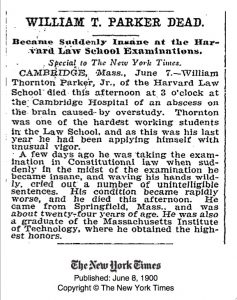
New York Times
As a conclusion studying may be the most important job that a student have but immoderation in anything can be harmful. An organized and moderate daily plan can be solution for a excellent academical and personal life. Overstuding can cause serious mental and physical problems which in extreme cases can lead to death. It may sound like a joke but understudying can be better than overstudying.
Author: Asana Khajavi
3 responses to “ Overstudying can actually cause your death ”
Leave a reply cancel reply.
You must be logged in to post a comment.
If you want to add yourself to this blog, please log in.
Recent Posts
- A Small Step for Mankind, A Large leap for Cancer Research
- Origion of The Kwäday Dän Ts’ìnchi Man Inferred Through Mitochondrial DNA Analysis
- Antioxidants, and how studying rare diseases could cure common illnesses
- Cocaine addiction: Not so cut and dry
- Usage of mathematics for an understanding of how the brain functions
- Biological Sciences
- Issues in Science
- Outreach Project
- Public Engagement
- Science Communication
- Science Communicators
- Science in News
- Uncategorized
This work by SCIE300 2017W211 is licensed under a Creative Commons Attribution-NonCommercial-NoDerivs 2.5 Canada .
Spam prevention powered by Akismet
share this!
August 16, 2021
Is it time to get rid of homework? Mental health experts weigh in
by Sara M Moniuszko

It's no secret that kids hate homework. And as students grapple with an ongoing pandemic that has had a wide-range of mental health impacts, is it time schools start listening to their pleas over workloads?
Some teachers are turning to social media to take a stand against homework .
Tiktok user @misguided.teacher says he doesn't assign it because the "whole premise of homework is flawed."
For starters, he says he can't grade work on "even playing fields" when students' home environments can be vastly different.
"Even students who go home to a peaceful house, do they really want to spend their time on busy work? Because typically that's what a lot of homework is, it's busy work," he says in the video that has garnered 1.6 million likes. "You only get one year to be 7, you only got one year to be 10, you only get one year to be 16, 18."
Mental health experts agree heavy work loads have the potential do more harm than good for students, especially when taking into account the impacts of the pandemic. But they also say the answer may not be to eliminate homework altogether.
Emmy Kang, mental health counselor at Humantold, says studies have shown heavy workloads can be "detrimental" for students and cause a "big impact on their mental, physical and emotional health."
"More than half of students say that homework is their primary source of stress, and we know what stress can do on our bodies," she says, adding that staying up late to finish assignments also leads to disrupted sleep and exhaustion.
Cynthia Catchings, a licensed clinical social worker and therapist at Talkspace, says heavy workloads can also cause serious mental health problems in the long run, like anxiety and depression.
And for all the distress homework causes, it's not as useful as many may think, says Dr. Nicholas Kardaras, a psychologist and CEO of Omega Recovery treatment center.
"The research shows that there's really limited benefit of homework for elementary age students, that really the school work should be contained in the classroom," he says.
For older students, Kang says homework benefits plateau at about two hours per night.
"Most students, especially at these high-achieving schools, they're doing a minimum of three hours, and it's taking away time from their friends from their families, their extracurricular activities. And these are all very important things for a person's mental and emotional health."
Catchings, who also taught third to 12th graders for 12 years, says she's seen the positive effects of a no homework policy while working with students abroad.
"Not having homework was something that I always admired from the French students (and) the French schools, because that was helping the students to really have the time off and really disconnect from school ," she says.
The answer may not be to eliminate homework completely, but to be more mindful of the type of work students go home with, suggests Kang, who was a high-school teacher for 10 years.
"I don't think (we) should scrap homework, I think we should scrap meaningless, purposeless busy work-type homework. That's something that needs to be scrapped entirely," she says, encouraging teachers to be thoughtful and consider the amount of time it would take for students to complete assignments.
The pandemic made the conversation around homework more crucial
Mindfulness surrounding homework is especially important in the context of the last two years. Many students will be struggling with mental health issues that were brought on or worsened by the pandemic, making heavy workloads even harder to balance.
"COVID was just a disaster in terms of the lack of structure. Everything just deteriorated," Kardaras says, pointing to an increase in cognitive issues and decrease in attention spans among students. "School acts as an anchor for a lot of children, as a stabilizing force, and that disappeared."
But even if students transition back to the structure of in-person classes, Kardaras suspects students may still struggle after two school years of shifted schedules and disrupted sleeping habits.
"We've seen adults struggling to go back to in-person work environments from remote work environments. That effect is amplified with children because children have less resources to be able to cope with those transitions than adults do," he explains.
'Get organized' ahead of back-to-school
In order to make the transition back to in-person school easier, Kang encourages students to "get good sleep, exercise regularly (and) eat a healthy diet."
To help manage workloads, she suggests students "get organized."
"There's so much mental clutter up there when you're disorganized... sitting down and planning out their study schedules can really help manage their time," she says.
Breaking assignments up can also make things easier to tackle.
"I know that heavy workloads can be stressful, but if you sit down and you break down that studying into smaller chunks, they're much more manageable."
If workloads are still too much, Kang encourages students to advocate for themselves.
"They should tell their teachers when a homework assignment just took too much time or if it was too difficult for them to do on their own," she says. "It's good to speak up and ask those questions. Respectfully, of course, because these are your teachers. But still, I think sometimes teachers themselves need this feedback from their students."
©2021 USA Today Distributed by Tribune Content Agency, LLC.
Explore further
Feedback to editors

Early medieval money mystery solved
5 hours ago

Finding new chemistry to capture double the carbon
7 hours ago

Americans are bad at recognizing conspiracy theories when they believe they're true, says study
8 hours ago

A total solar eclipse races across North America as clouds part along totality

New statistical-modeling workflow may help advance drug discovery and synthetic chemistry

Researchers develop better way to make painkiller from trees
9 hours ago

Replacing plastics with alternatives is worse for greenhouse gas emissions in most cases, study finds

A targeted polymer to treat colorectal cancer liver metastases

When an antibiotic fails: Scientists are using AI to target 'sleeper' bacteria

Scientists discover new phage resistance mechanism in phage-bacterial arms race
Relevant physicsforums posts, motivating high school physics students with popcorn physics.
Apr 3, 2024
How is Physics taught without Calculus?
Mar 29, 2024
Why are Physicists so informal with mathematics?
Mar 24, 2024
The changing physics curriculum in 1961
Suggestions for using math puzzles to stimulate my math students.
Mar 21, 2024
The New California Math Framework: Another Step Backwards?
Mar 14, 2024
More from STEM Educators and Teaching
Related Stories

Smartphones are lowering student's grades, study finds
Aug 18, 2020

Doing homework is associated with change in students' personality
Oct 6, 2017

Scholar suggests ways to craft more effective homework assignments
Oct 1, 2015

Should parents help their kids with homework?
Aug 29, 2019

How much math, science homework is too much?
Mar 23, 2015

Anxiety, depression, burnout rising as college students prepare to return to campus
Jul 26, 2021
Recommended for you

Earth, the sun and a bike wheel: Why your high-school textbook was wrong about the shape of Earth's orbit
11 hours ago

Touchibo, a robot that fosters inclusion in education through touch
Apr 5, 2024

More than money, family and community bonds prep teens for college success: Study

Research reveals significant effects of onscreen instructors during video classes in aiding student learning
Mar 25, 2024

Prestigious journals make it hard for scientists who don't speak English to get published, study finds
Mar 23, 2024

Using Twitter/X to promote research findings found to have little impact on number of citations
Mar 22, 2024
Let us know if there is a problem with our content
Use this form if you have come across a typo, inaccuracy or would like to send an edit request for the content on this page. For general inquiries, please use our contact form . For general feedback, use the public comments section below (please adhere to guidelines ).
Please select the most appropriate category to facilitate processing of your request
Thank you for taking time to provide your feedback to the editors.
Your feedback is important to us. However, we do not guarantee individual replies due to the high volume of messages.
E-mail the story
Your email address is used only to let the recipient know who sent the email. Neither your address nor the recipient's address will be used for any other purpose. The information you enter will appear in your e-mail message and is not retained by Phys.org in any form.
Newsletter sign up
Get weekly and/or daily updates delivered to your inbox. You can unsubscribe at any time and we'll never share your details to third parties.
More information Privacy policy
Donate and enjoy an ad-free experience
We keep our content available to everyone. Consider supporting Science X's mission by getting a premium account.
E-mail newsletter
- Home Home This is where you can find all the blog posts throughout the site.
- Categories Categories Displays a list of categories from this blog.
- Tags Tags Displays a list of tags that have been used in the blog.
- Bloggers Bloggers Search for your favorite blogger from this site.
- Login Login Login form Username Register Password Forgot Password? Remember me Login
Homework Won’t Kill You…Will It?
- Font size: Larger Smaller
- Hits: 14020
- Subscribe to this entry
High school students who spend more time on homework are more mentally engaged at school but suffer from increased academic stress, a lack of day to day balance in their lives, and even physical health issues, according a recent article published in The Journal of Experimental Education .
In most modern upper middle class homes, homework is considered to be helpful. It is a way for students to gain a competitive edge over others and broaden their understanding of some subjects. However, many parents would be shocked to learn that homework, and parental pressure to complete it, is actually causing tremendous stress on their children. In fact, some students report that they are willing to sacrifice their health and integrity to complete an assignment and increase their academic standing. In such a high stress environment, learning is becoming secondary and completing an assignment is seen as necessary to gain proper credentials and be competitive. To assess the effects of homework, the researchers sampled 4,317 students from ten different high performing high schools in upper-middle class communities. In the study, students were asked to answer open-ended and Likert type questions during a 40 minute survey. The Likert type was designed to measure the relationship between homework and well-being and engagement. The open-ended questions were designed to get a feel for the student’s voice and opinion on certain effects of homework. Schools were asked to administer the surveys during time periods between stressful events such as finals to avoid skewing the data. The study shows 56 percent of students find homework to be a primary stressor. Students also say that they often find homework to be tedious and boring and do not believe they are gaining much out of it. Further reports indicate that students are more stressed and less able to sleep due to homework load. This lack of sleep and stress leads to students having a hard time focusing in class and some physical health problems, like an upset stomach. Many may ask, “If homework is so stressful then why do it?” Some answers that were noted are that students only complete these assignments because overall grades usually hinge on homework. Other reasons range from parental pressure to concerns about getting into college. One particularly interesting response about college expectations was, “College admissions expect students do so much, when in reality, the only way to truly be that outstanding is to not sleep and kill yourself with work”. This study suggests that educators need to take a look at the amount of homework that they are giving. It is not to say that homework should be banned but rather too much homework can be counterproductive therefore assignments should be gauged for maximum effectiveness. In the way of research, this study draws attention of researchers back to the fundamental questions of why homework is given and how effective it really is. Although this survey only covered a relatively small percentage of students, its effects are profound. Future research should be directed at covering more ground and possibly repeating this study with less privileged schools. Furthermore, research should be done to test the effects of removing homework loads to some extent from students. Galloway, M., Conner, J., & Denise, P. (2013). Nonacademic Effects of Homework in Privileged, High-Performing High Schools. The Journal of Experimental Education, 81 (4), 490-510. doi: 10.1080/00220973.2012.745469 By Chad Sechrest NC State Pre-Service Teacher
- Not Cheating Because You Fear Punishment? You May ...
- Are Students Motivated to Achieve in Order to Stan...
- Forgot your username?
- Forgot your password?
Is it time to get rid of homework? Mental health experts weigh in.

It's no secret that kids hate homework. And as students grapple with an ongoing pandemic that has had a wide range of mental health impacts, is it time schools start listening to their pleas about workloads?
Some teachers are turning to social media to take a stand against homework.
Tiktok user @misguided.teacher says he doesn't assign it because the "whole premise of homework is flawed."
For starters, he says, he can't grade work on "even playing fields" when students' home environments can be vastly different.
"Even students who go home to a peaceful house, do they really want to spend their time on busy work? Because typically that's what a lot of homework is, it's busy work," he says in the video that has garnered 1.6 million likes. "You only get one year to be 7, you only got one year to be 10, you only get one year to be 16, 18."
Mental health experts agree heavy workloads have the potential do more harm than good for students, especially when taking into account the impacts of the pandemic. But they also say the answer may not be to eliminate homework altogether.
Emmy Kang, mental health counselor at Humantold , says studies have shown heavy workloads can be "detrimental" for students and cause a "big impact on their mental, physical and emotional health."
"More than half of students say that homework is their primary source of stress, and we know what stress can do on our bodies," she says, adding that staying up late to finish assignments also leads to disrupted sleep and exhaustion.
Cynthia Catchings, a licensed clinical social worker and therapist at Talkspace , says heavy workloads can also cause serious mental health problems in the long run, like anxiety and depression.
And for all the distress homework can cause, it's not as useful as many may think, says Dr. Nicholas Kardaras, a psychologist and CEO of Omega Recovery treatment center.
"The research shows that there's really limited benefit of homework for elementary age students, that really the school work should be contained in the classroom," he says.
For older students, Kang says, homework benefits plateau at about two hours per night.
"Most students, especially at these high achieving schools, they're doing a minimum of three hours, and it's taking away time from their friends, from their families, their extracurricular activities. And these are all very important things for a person's mental and emotional health."
Catchings, who also taught third to 12th graders for 12 years, says she's seen the positive effects of a no-homework policy while working with students abroad.
"Not having homework was something that I always admired from the French students (and) the French schools, because that was helping the students to really have the time off and really disconnect from school," she says.
The answer may not be to eliminate homework completely but to be more mindful of the type of work students take home, suggests Kang, who was a high school teacher for 10 years.
"I don't think (we) should scrap homework; I think we should scrap meaningless, purposeless busy work-type homework. That's something that needs to be scrapped entirely," she says, encouraging teachers to be thoughtful and consider the amount of time it would take for students to complete assignments.
The pandemic made the conversation around homework more crucial
Mindfulness surrounding homework is especially important in the context of the past two years. Many students will be struggling with mental health issues that were brought on or worsened by the pandemic , making heavy workloads even harder to balance.
"COVID was just a disaster in terms of the lack of structure. Everything just deteriorated," Kardaras says, pointing to an increase in cognitive issues and decrease in attention spans among students. "School acts as an anchor for a lot of children, as a stabilizing force, and that disappeared."
But even if students transition back to the structure of in-person classes, Kardaras suspects students may still struggle after two school years of shifted schedules and disrupted sleeping habits.
"We've seen adults struggling to go back to in-person work environments from remote work environments. That effect is amplified with children because children have less resources to be able to cope with those transitions than adults do," he explains.
'Get organized' ahead of back-to-school
In order to make the transition back to in-person school easier, Kang encourages students to "get good sleep, exercise regularly (and) eat a healthy diet."
To help manage workloads, she suggests students "get organized."
"There's so much mental clutter up there when you're disorganized. ... Sitting down and planning out their study schedules can really help manage their time," she says.
Breaking up assignments can also make things easier to tackle.
"I know that heavy workloads can be stressful, but if you sit down and you break down that studying into smaller chunks, they're much more manageable."
If workloads are still too much, Kang encourages students to advocate for themselves.
"They should tell their teachers when a homework assignment just took too much time or if it was too difficult for them to do on their own," she says. "It's good to speak up and ask those questions. Respectfully, of course, because these are your teachers. But still, I think sometimes teachers themselves need this feedback from their students."
More: Some teachers let their students sleep in class. Here's what mental health experts say.
More: Some parents are slipping young kids in for the COVID-19 vaccine, but doctors discourage the move as 'risky'
🍽 Today's Menu
- Editor's Pick
Studying Can Actually Kill You

You may have received harried text messages over the past few days which say something like, "Studying any more today will literally kill me." We would usually take issue with the seemingly poor use of the word " literally " here, but precedent shows that it actually is possible to die from studying too much.
In 1900, Harvard Law School student William T. Parker Jr. went crazy—as in "waving his hands wildly, [he] cried out a number of unintelligible sentences"—during an exam. He was promptly sent to a hospital, where he died several days later of "an abscess on the brain caused by overstudy," according to the New York Times .
To avoid the unfortunate fate of death by studying, keep these simple tips in mind:
1. Remember that this is just school. Yes, your GPA is semi-important for being admitted to that top graduate school or getting recruited by that consulting firm. But that's a very small part of the flourishing, colorful, and joyful life you will lead after school, and if you die from studying you'll miss out on all that anyway.
2. Be with people. Sit with a few friends while you're studying or writing that paper. Everyone has schoolwork to do at this time of the year, so there's no fear of people distracting you. Being around other people makes us feel good, even if there's little conversation. It's science! If you don't have friends, email this Flyby correspondent. We can be friends!
3. Know your food options. It's all well and good to say that you should sleep and eat regularly even during finals, but we all know that sometimes that's just not going to happen. It's a rough world out there when your sleeping schedule is so out of whack that you miss all the dining hall hours. One can only subsist on brain break food for so many nights. Places like Au Bon Pain and Café Pamplona stay open late, and they take Crimson Cash. Market on the Square is also an excellent late-night choice. You can hit up the Quad Grille or the Quincy Grille; they might not stock the healthiest food, but they take Board Plus—and is there anything more life-affirming than warm, melty, comforting mozzarella sticks at 2 a.m.?
4. Use the resources that are available to you. This can vary from demanding study guides from a friend who took that Gen Ed class last year to checking out UHS or the Bureau of Study Counsel. Those offices can help you come up with a doable timeline for your work or can just patiently listen while you whine about how stressed out you are. Don't forget about your Resident Dean, either: if you're actually in a crisis, your Dean can help you get extensions.
Harvard Today
The latest in your inbox., follow flyby online..

Too Much Homework Hurts Your Students. Here’s What to Do Instead.
- Post author: The CTTL
- Post published: February 28, 2019
- Post category: Teaching Strategies
At the CTTL , we’re focused on using the best of Mind, Brain, and Education Science research to help teachers maximize their effectiveness and guide students toward their greatest potential. Doing that often means addressing what we like to call “Learning Myths”—those traditional bits of teaching wisdom that are often accepted without question, but aren’t always true. We also like to introduce new insight that can change the classroom for the better. In our Learning Myths series, we’ll explore true-or-false statements that affect teacher and student performance; for each, we’ll dive into the details that support the facts, leaving teachers with actionable knowledge that they can put to work right away.
True or False? Homework should be given every night, as this routine promotes learning.
Answer: False! Nightly homework is unnecessary—and can actually be harmful.
Homework for homework’s sake, or homework that’s not tied into the classroom experience, is a demotivating waste of your students’ time and energy. The Education Endowment Foundation Teaching and Learning Toolkit puts it this way: “Planned and focused activities are more beneficial than homework, which is more regular, but may be routine or not linked with what is being learned in class.”
How might teachers put this insight into action?
Homework, in itself, isn’t a bad thing. The key is to make sure that every homework assignment is both necessary and relevant—and leaves students with some time to rest and investigate other parts of their lives. Here are four key mindsets to adopt as an educator:
Resist the traditional wisdom that equates hardship with learning. Assigning constant homework is often tied into the idea that the more rigorous a class is, the better it is. However, according to research from Duke University’s Professor Harris Cooper, this belief is mistaken: “too much homework may diminish its effectiveness, or even become counterproductive.” A better guideline for homework, Cooper suggests, is to assign 1-2 hours of total homework in high school, and only up to 1 hour in junior high or middle school. This is based on the understanding that school-aged children are developing quickly in multiple realms of their lives; thus, family, outside interests, and sleep all take an unnecessary and damaging hit if students are spending their evenings on busy work. Even for high schoolers, more than two hours of homework was not associated with greater levels of achievement in Cooper’s study.
Remember that some assignments help learning more than others—and they tend to be simple, connected ones. Research suggests that the more open-ended and unstructured assignments are, the smaller the effect they have on learning. The best kind of homework is made of planned, focused activities that help reinforce what’s been happening in class. Using the spacing effect is one way to help students recall and remember what they’ve been learning: for example, this could include a combination of practice questions from what happened today, three days ago, and five days ago. (You can also consider extending this idea by integrating concepts and skills from other parts of your course into your homework materials). Another helpful approach is to assign an exercise that acts as a simple introduction to material that is about to be taught. In general, make sure that all at-home activities are a continuation of the story that’s playing out in class—in other words, that they’re tied into what happened before the assignment, as well as what will happen next.
When it comes to homework, stay flexible. Homework shouldn’t be used to teach complex new ideas and skills. Because it’s so important that homework is closely tied with current learning, it’s important to prepare to adjust your assignments on the fly: if you end up running out of time and can’t cover all of a planned subject on a given day, nix any homework that relies on it.
Never use homework as a punishment. Homework should never be used as a disciplinary tool or a penalty. It’s important for students to know and trust that what they’re doing at home is a vital part of their learning.
Make sure that your students don’t get stuck before they begin. Teachers tend to under-appreciate one very significant problem when it comes to homework: often, students just don’t know how to do the assignment! Being confused by the instructions—and without the means to remedy the situation—is extremely demotivating. If you find (or suspect) that this might be a problem for your students, one helpful strategy is to give students a few minutes in class to begin their homework, so that you can address any clarifying questions that arise.
In order for students to become high academic achievers, they have to be learning in a way that challenges them at the right level— much like the porridge in the Goldilocks story, it’s got to be just right. Homework is a great tool, but it must be used wisely. Part of our role as teachers is to make sure that the time we ask our students to give us after they leave class is meaningful to their learning; otherwise, the stress and demotivation of “just because” homework can be detrimental to their well-being. As the CTTL’s Dr. Ian Kelleher advises, “The best homework assignments are just 20 minutes long, because those are the ones that the teacher has really planned out carefully.” Put simply: quality beats out quantity, every time.
Here at the CTTL, we’re all about quality over quantity. Case in point: our newest endeavor, Neuroteach Global , helps teachers infuse their classroom practices with research-informed strategies for student success—in just 3-5 minutes a day, on a variety of devices.
You Might Also Like
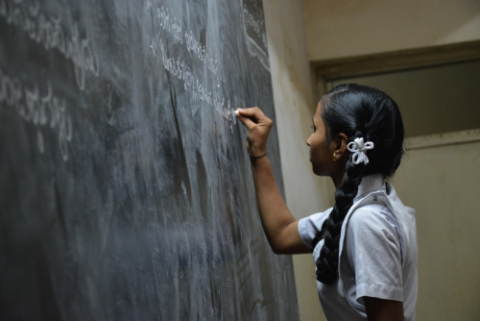
How to Take Metacognition to the Next Level in Your Classroom

Six Elements at the Core of Great (Online) Teaching

Make the Feedback Loop Your 2021 Teaching Takeaway
Is Homework Good for Kids? Here’s What the Research Says
A s kids return to school, debate is heating up once again over how they should spend their time after they leave the classroom for the day.
The no-homework policy of a second-grade teacher in Texas went viral last week , earning praise from parents across the country who lament the heavy workload often assigned to young students. Brandy Young told parents she would not formally assign any homework this year, asking students instead to eat dinner with their families, play outside and go to bed early.
But the question of how much work children should be doing outside of school remains controversial, and plenty of parents take issue with no-homework policies, worried their kids are losing a potential academic advantage. Here’s what you need to know:
For decades, the homework standard has been a “10-minute rule,” which recommends a daily maximum of 10 minutes of homework per grade level. Second graders, for example, should do about 20 minutes of homework each night. High school seniors should complete about two hours of homework each night. The National PTA and the National Education Association both support that guideline.
But some schools have begun to give their youngest students a break. A Massachusetts elementary school has announced a no-homework pilot program for the coming school year, lengthening the school day by two hours to provide more in-class instruction. “We really want kids to go home at 4 o’clock, tired. We want their brain to be tired,” Kelly Elementary School Principal Jackie Glasheen said in an interview with a local TV station . “We want them to enjoy their families. We want them to go to soccer practice or football practice, and we want them to go to bed. And that’s it.”
A New York City public elementary school implemented a similar policy last year, eliminating traditional homework assignments in favor of family time. The change was quickly met with outrage from some parents, though it earned support from other education leaders.
New solutions and approaches to homework differ by community, and these local debates are complicated by the fact that even education experts disagree about what’s best for kids.
The research
The most comprehensive research on homework to date comes from a 2006 meta-analysis by Duke University psychology professor Harris Cooper, who found evidence of a positive correlation between homework and student achievement, meaning students who did homework performed better in school. The correlation was stronger for older students—in seventh through 12th grade—than for those in younger grades, for whom there was a weak relationship between homework and performance.
Cooper’s analysis focused on how homework impacts academic achievement—test scores, for example. His report noted that homework is also thought to improve study habits, attitudes toward school, self-discipline, inquisitiveness and independent problem solving skills. On the other hand, some studies he examined showed that homework can cause physical and emotional fatigue, fuel negative attitudes about learning and limit leisure time for children. At the end of his analysis, Cooper recommended further study of such potential effects of homework.
Despite the weak correlation between homework and performance for young children, Cooper argues that a small amount of homework is useful for all students. Second-graders should not be doing two hours of homework each night, he said, but they also shouldn’t be doing no homework.
Not all education experts agree entirely with Cooper’s assessment.
Cathy Vatterott, an education professor at the University of Missouri-St. Louis, supports the “10-minute rule” as a maximum, but she thinks there is not sufficient proof that homework is helpful for students in elementary school.
“Correlation is not causation,” she said. “Does homework cause achievement, or do high achievers do more homework?”
Vatterott, the author of Rethinking Homework: Best Practices That Support Diverse Needs , thinks there should be more emphasis on improving the quality of homework tasks, and she supports efforts to eliminate homework for younger kids.
“I have no concerns about students not starting homework until fourth grade or fifth grade,” she said, noting that while the debate over homework will undoubtedly continue, she has noticed a trend toward limiting, if not eliminating, homework in elementary school.
The issue has been debated for decades. A TIME cover in 1999 read: “Too much homework! How it’s hurting our kids, and what parents should do about it.” The accompanying story noted that the launch of Sputnik in 1957 led to a push for better math and science education in the U.S. The ensuing pressure to be competitive on a global scale, plus the increasingly demanding college admissions process, fueled the practice of assigning homework.
“The complaints are cyclical, and we’re in the part of the cycle now where the concern is for too much,” Cooper said. “You can go back to the 1970s, when you’ll find there were concerns that there was too little, when we were concerned about our global competitiveness.”
Cooper acknowledged that some students really are bringing home too much homework, and their parents are right to be concerned.
“A good way to think about homework is the way you think about medications or dietary supplements,” he said. “If you take too little, they’ll have no effect. If you take too much, they can kill you. If you take the right amount, you’ll get better.”
More Must-Reads From TIME
- Jane Fonda Champions Climate Action for Every Generation
- Passengers Are Flying up to 30 Hours to See Four Minutes of the Eclipse
- Biden’s Campaign Is In Trouble. Will the Turnaround Plan Work?
- Essay: The Complicated Dread of Early Spring
- Why Walking Isn’t Enough When It Comes to Exercise
- The Financial Influencers Women Actually Want to Listen To
- The Best TV Shows to Watch on Peacock
- Want Weekly Recs on What to Watch, Read, and More? Sign Up for Worth Your Time
Write to Katie Reilly at [email protected]
You May Also Like
August 22, 2022

Children’s Risk of Suicide Increases on School Days
Unlike in adults, suicide risk among children is lowest during the summer and higher during the school year. Understanding these patterns can help prevent and treat suicidality
By Tyler Black
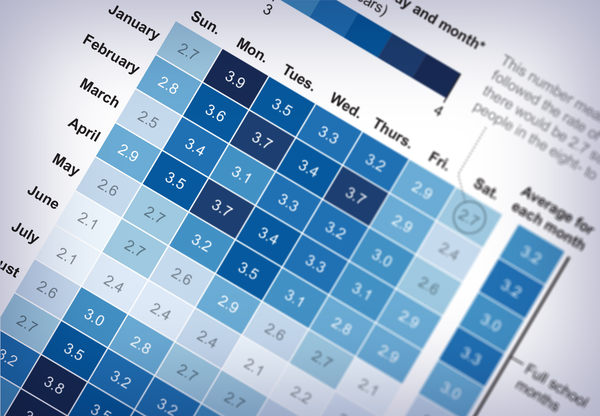
Amanda Montañez
Reading about death and suicidality can be distressing. Please read this in a moment where you feel safest and ready to do so.
Pediatricians, child psychologists and psychiatrists, social workers and pediatric emergency teams know something that many people who care for children don’t: we are much busier during the school year. I’m a full-time emergency psychiatrist who works at a major children’s hospital, and often when children come in for a mental health crisis, one of the main stressors they discuss is school.
I’m sure most people assume I commonly prescribe medications as a physician, but one of my most common “prescriptions” is advocating for reducing school burden and load. In a 2013 American Psychological Association survey, 83 percent of adolescents stated that school was a cause or significant source of stress . In a 2017 survey of school leaders in the U.K., 82 percent reported increased mental health issues among primary school children during the time of national examinations. In studies in 2013 and 2015, scientists studying homework in the U.S. found that primary school children were averaging 30 minutes of such work per night, while high-performing secondary students were averaging more than three hours per night, at the cost of their physical health and schoolwork-life balance.
On supporting science journalism
If you're enjoying this article, consider supporting our award-winning journalism by subscribing . By purchasing a subscription you are helping to ensure the future of impactful stories about the discoveries and ideas shaping our world today.
Whether we are talking about referrals to mental health programs for crisis, presentations to emergency departments for mental health issues, admissions to intensive care units for urgent treatment of suicide attempts or deaths by suicide, an association with school is clear. We are able to visualize this in a number of ways.
By using the Centers for Disease Control and Prevention’s Wonder database to find information on pediatric (17 years of age or younger) deaths by suicide, I have created a “heat map” of youth suicide, and a school-day association is plain to see. On weekdays and during school months, there is a significant elevation of suicide deaths in children.
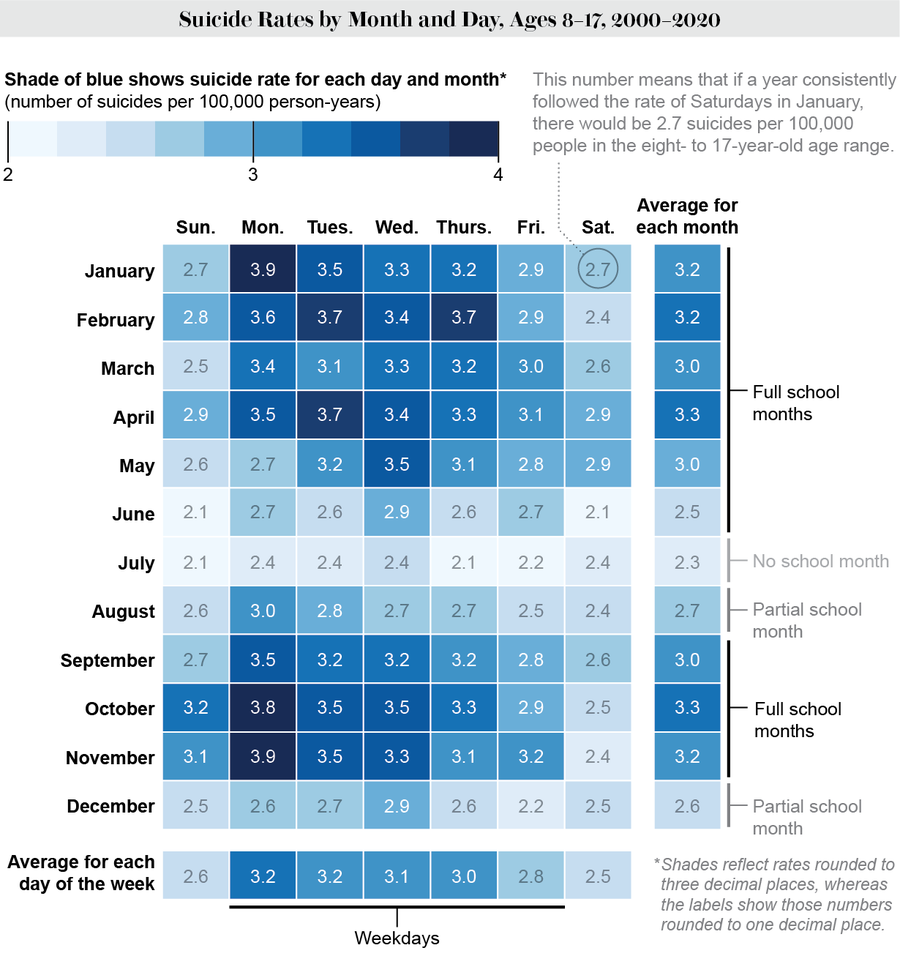
Credit: Amanda Montañez; Source: CDC Wonder , Centers for Disease Control and Prevention; Data analysis by Tyler Black
Looking at the monthly data, we can see that this elevation is not trivial: during school months, the increase in pediatric suicides ranges between 30 and 43 percent. This is in sharp contrast with adults, where we see suicide rates typically peak in summer months.
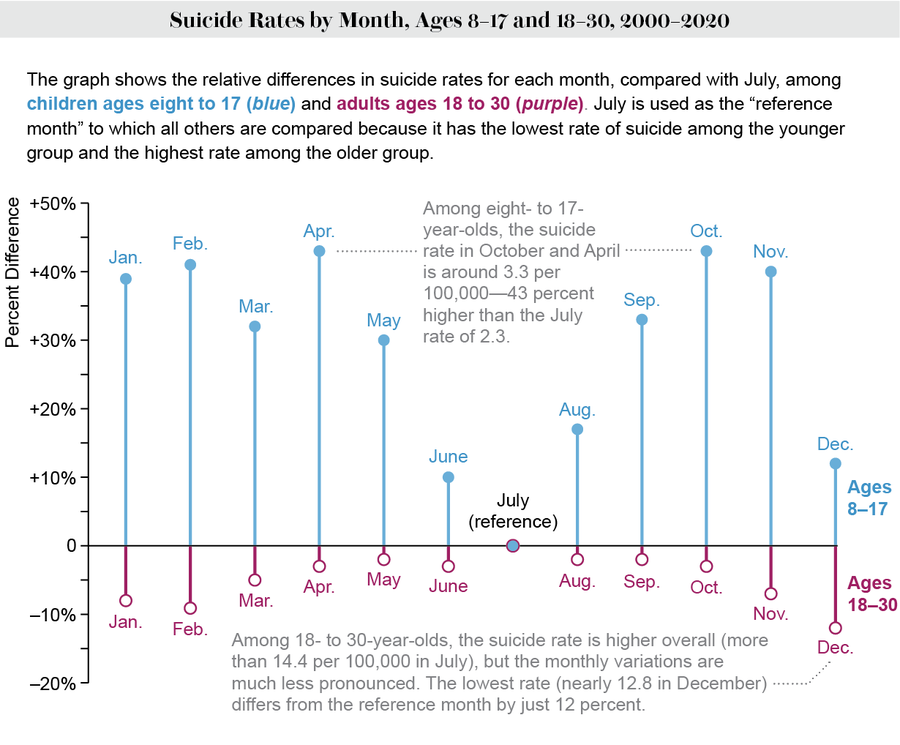
This situation has not improved over time: Compared with summer weekends, school-month weekdays from 2016 to 2019 show a pediatric suicide rate increase of 62 percent. The increase was 42% from 1999 to 2015.
If we look at far more common events, such as emergency room visits for mental health conditions, we see a strikingly similar pattern. These data come from participating hospitals in a collection done by the CDC.
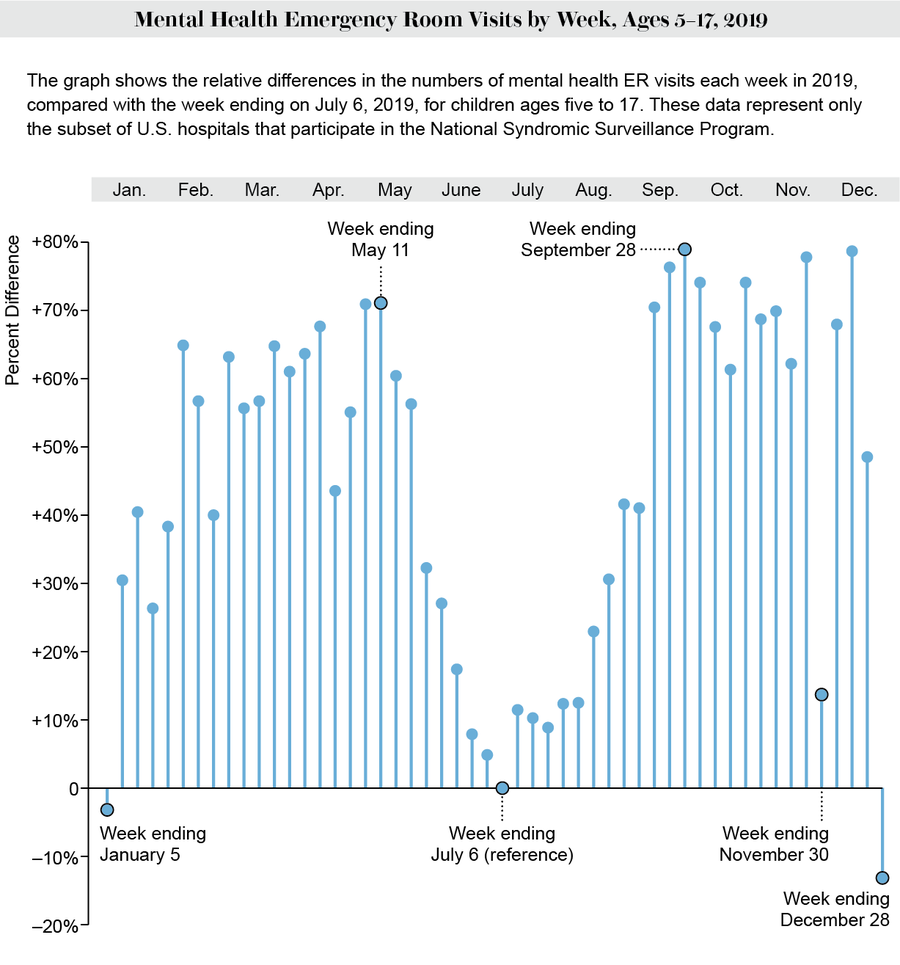
Credit: Amanda Montañez; National Syndromic Surveillance Program via Centers for Disease Control and Prevention
School comes with many things, good and bad. School can be wonderful, with learning experiences, social successes and a sense of connection to others. But it can also be incredibly stressful because of academic burden, bullying, health- and disability-related barriers, discrimination, lack of sleep and sometimes abuse. I often liken going to school to a child’s full-time job. The child has co-workers (classmates arranged by hierarchy), supervisors (teachers), bosses (administrators and principals) and overtime (homework). And they have very early work hours (most schools have hours that are very incompatible with children’s sleep patterns). Of course, work can be rewarding, but it’s also stressful.
Any time I present these data to teachers, parents, principals or school administrators, they are shocked. This should be common knowledge. Pediatric suicides and mental health crisis rates increase sharply when school is in and ease when school is out. This pattern is also found in other jurisdictions, such as Japan , Germany and Finland .
There are a number of ways to potentially mitigate this distress that I wish those responsible for our children’s education would explore. Some suggestions I’d put forth:
Reduce homework (preferably get rid of it). Some of the best educational science available shows that excessive homework is of limited benefit and in fact harms children’s health and well-being.
Add a mental health curriculum. We have developed incredible educational goals for math, reading, science and the arts. There should be a dedicated pathway for a much more universal and necessary learning: how to take care of yourself; how to look out for and help others; and how to improve both the detection and prevention of mental health crises.
Take bullying seriously and don’t just focus on the bullies. The bullied and bullies often come from similar backgrounds (histories of abuse, trauma, chaos, deprivation, parental detachment, though this certainly isn’t universally the case). But whereas the bullied tend to be internalizers, the bullies are more often externalizers. Bullies who were once victims of bullying have the highest risk of having psychiatric problems in the future.
Restore funding for playtime, music and art in school and de-emphasize academic overload. Children need relaxation, comfort, beauty, fun and play. Children who have opportunities to play and rest will learn more in their academics, and they will be able to sustain their development as they grow.
End “perfect attendance” awards and goals. While problematic truancy should be addressed, there is no less realistic notion for the rest of one’s life than the idea of “perfect attendance.” We should all, from time to time, recognize when we are at our limit and need a break. Children should be encouraged to report when they can do so and be supported.
Start school later. How many more decades of research do we need to show that children need more sleep and that adolescents do better in school when the day starts later? It’s time to make serious structural changes to the early-morning wake-up times.
Be nonjudgmental and respect children’s identity and identity formation. This is not a “woke” concept. This is a caring, compassionate concept that works for all children all the time.
Recognize and address child abuse within schools. There exist (and many readers may likely recall) teachers who are abusive, punitive and cruel. In one 2015 study, 44 percent of undergraduates recalled a time in K–12 school that they labeled as emotional abuse by a teacher . And in another study published in 2019, 3.4 percent of seventh- and eighth-grade students reported teachers bullied them .
Every year my colleagues in the emergency department brace for the coming mid-September wave, as every year our mental health crisis presentation volumes double and our days become much busier. Likely not coincidentally, in my jurisdiction, school starts in the second week of September.
In the new school year, if you are someone who works with school-age children, ask yourself what you could be doing to reduce pressure or improve quality of life for the children in your care. This would truly be suicide prevention.
IF YOU NEED HELP If you or someone you know is struggling or having thoughts of suicide, help is available. Call or text the 988 Suicide & Crisis Lifeline at 988 or use the online Lifeline Chat . LGBTQ+ Americans can reach out to the Trevor Project by texting START to 678-678 or calling 1-866-488-7386.
This is an opinion and analysis article, and the views expressed by the author or authors are not necessarily those of Scientific American .

Is Homework Illegal? Why Homework is Absolutely Bad for Students

Before we dive into the question”Is homework illegal (or should it be?), if you have students who are struggling or are in need of an additional challenge, gamification is a GREAT way to engage students in learning. You can grab my 5 step guide to implementing gamification below!
Send me my Gamification Guide!
My personal homework assignment experiences.
I feel that this section might “give up the goat” as to my feelings on homework.
It was 1990, and I was a cute little 5th grader in Mrs. Scholle’s class. I LOVED Mrs. Scholle and still do to this day. A student taught where I attended school as a kid and would hang out in her room to chat or help with extra tasks. While I very much remember Mrs. Scholle fondly, I vividly remember the crushing amount of homework that we were often assigned.
I was always a student who excelled. I did not struggle with the material itself, but I remember sitting at the dining room table, crying into the night because there was sooo much work to do. The work was tedious, repetitive, and not teaching me anything new. I wanted to watch tv, go outside or play Nintendo, but instead, I was inside doing loads of math problems. The sheer amount of homework is seared into my brain and shaped my views as a teacher.
My Homework Policy as a Teacher
When I had my classroom of third graders, I vowed not to assign any homework if I could help it. If the school required it, fine, then it would be time-based, not task-based and only checked for completion. I didn’t want to take work home, neither did they. Why should I spend time grading work that they either flew through, didn’t understand, or had extensive help from a parent? No one should be crying at the kitchen table after dinner.
By that time, research had started to question the benefit of homework, and parents questioned my lack of homework. My teammate gave out homework daily; why weren’t their children getting the same? My reply was always the same. For me, it was more important the kids enjoy the few free hours they had each day. They did enough school at school. Some kids were in sports and my gut told me that parents didn’t want to get home from a game only to have an hour of homework staring them in the face.
To make matters more difficult, my school was 95% free and reduced lunch. Many students went home to an empty house, or to parents who did not speak English, and therefore couldn’t help them with homework. How was it even fair to send homework home with them? When asked if there was anything that they could do at home, I simply said “Read. Read in any language, just read.”
Are there homework benefits?
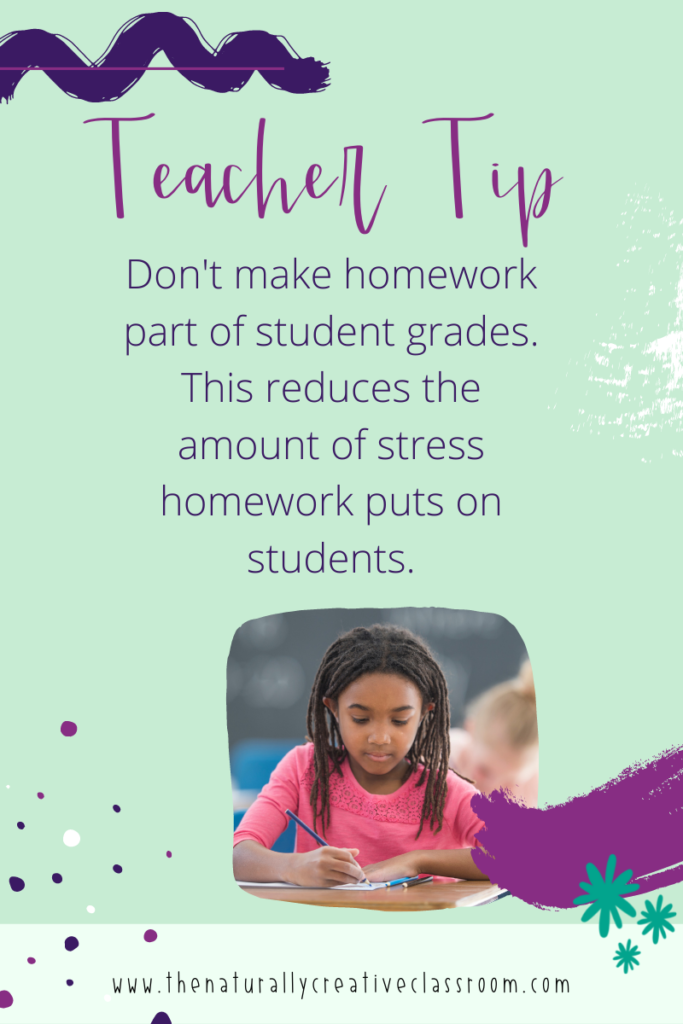
Does Homework Help or hurt learning?
Whether or not homework is a help or hindrance to learning is a question every teacher and administrator I have ever met struggles with. What is too much homework for kids? Should there be homework for 2nd graders? What about online homework? High schoolers should have homework, right? For kids, the critical questions are, “can homework kill you?” and “is homework illegal anywhere?”.
Unfortunately for kids, the answer to the last two questions is “no,” but the other questions have been debated for over 100 years, with the pendulum swinging in both directions.
A short history of homework for you
I could find no definitive answer of when homework was invented. Various sources credit Pliny the Younger from the Roman Empire, Roberto Nevilis of Italy in 1905, or Horace Mann. It seems likely that homework, in some form or another, has existed for a long time.
Today’s concept of homework is said to have been introduced by one of the last two men (right?! I mean, a WOMAN would have known that there is already PLENTY to do at home!). It was invented as a punishment or a way to show power over students’ time.
Homework was controversial almost as soon as it was introduced. At the turn of the 20th century, there were already homework bans in place in some states. However, as fears of the cold war grew and Americans dealt with concerns about falling behind, the amount of homework given to kids increased. Then, in the late 1960s and early 1970s, anti-homework sentiment grew again, and the amount of homework given to students decreased. THEN, just as I was entering the “workforce,” I mean, school, the country was experiencing an economic downturn. Who else to blame but teachers? The Department of Education thought that the amount of homework given to kids should increase.
Since then, time spent on homework has continued to increase, with Kindergarteners getting homework and some high school students reporting having up to three hours of homework each night.
Is Homework Illegal Anywhere?
The argument for why homework is important.
For those in the camp of wanting positive homework answers, you can look to Harris Cooper, a professor of psychology at Duke University. He has created the seminal study that most people look to decide if homework is beneficial. Cooper took studies that already existed from the mid-2000s and correlated the number of homework students reported doing to standardized test scores. He concluded that doing more homework correlated to higher test scores, and this correlation was strongest among older students.
Detractors have pointed out several flaws in his study, such as the research is based on self-reporting of kids, which is not entirely reliable. I would also like to see a study done directly with students, tracking the actual amount of homework and correlating it to test scores. A meta-analysis of other studies laid over test scores isn’t very convincing for me.
Another argument for why homework is good comes from parents. The first reason parents say they want homework is to make them feel connected with the learning process, and it lets them know what is going on in class and feel helpful and have a home-to-school connection. Parents also tend to use the amount of homework a teacher gives to judge the rigor of that classroom. A teacher who provides more homework is perceived to have more a more rigorous classroom.
In surveys, parents say they expect homework because THEY had homework. Parents see homework as a rite of passage that every child should have, and homework = school.
There is also the argument that homework is a great way to teach kids how to be organized. While I believe that it can teach organization, I think there are other, better ways to support organization. Have you ever tried to get a nine-year-old ready for baseball? They need so much equipment, and the natural consequences of missing something are pretty immediate. Students who take music lessons, art lessons, language classes need to be organized to be successful.
Of all the reading I have done over the years looking for homework answers, this is the extent of the evidence I have seen in homework support. Now, let’s take a look at the other side.

The argument for why homework is bad
On the other hand, there have been many studies outlining many problems with homework.
There are a few levels to the element of time.
The first problem with homework is the level of difficulty and how this affects the amount of time a student will spend on the homework. The general “rule of thumb” that I still hear from teachers today is “10 minutes of homework per grade, per night”. Following this rule means that 1st graders get ten minutes, second graders get 20 minutes, etc.
My question has always been, “whose ten minutes are we talking?” Let’s say homework for second graders is supposed to take twenty minutes, and Brynn flies through her given homework in ten minutes and can go out and play. On the other hand, Wyatt struggles through his homework, misses playtime outside, and his parents are sitting with him after dinner for over an hour, trying to help him. They believe it is vital that he gets it done before returning to school tomorrow.
The second element is, does the student have time to complete the work at home? A common complaint in a pre-pandemic world was that children are over-scheduled. There might not be sufficient time to do the homework at home between sports, music lessons, foreign language classes, church obligations, and art lessons.
Thirdly, some high school students work almost full time to help support their family or are entrusted with watching siblings when they get home. With these types of obligations, homework will fall to the back burner.
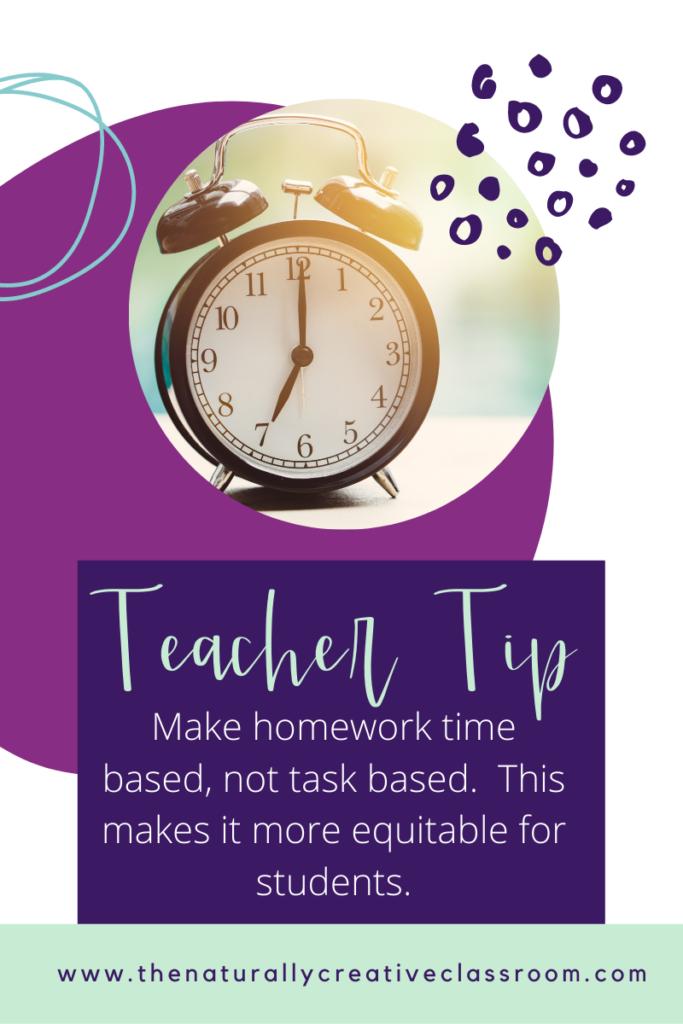
Lack of Differentiation
Others point out that homework has not changed much. At its best, homework WOULD ideally be differentiated for each student, giving them something engaging with enough challenge but not too difficult to lead to frustration. As a classroom teacher, I would have LOVED to do this for my students, but time is so fleeting and precious that spending time to differentiate homework does not feel like time well spent to me.
Differentiating homework to each student is asking a lot for already overwhelmed teachers.
Level of Parent Help
The amount of parent help that a student will have on homework varies widely between home and family situations. I have sometimes gotten homework that is done IN the parent’s handwriting, while other students have parents whose first language is not English or whose parents work two jobs and are not around to help them. This highlights one of the elements of lack of equity in homework.
Another issue with parent help is that sometimes it can be detrimental! When a parent attempts to help students, sometimes the parent has forgotten or thinks they know how to tackle the homework. I have personally seen this when dealing with new ways to approach math problems. The newer, more concrete, and conceptual ways are sometimes confusing for parents. This is when you see the standard algorithm pop up in homework before it the teacher introduces it in class. When a parent helps their child in the wrong way with homework, this can lead to homework help discord in the home.
Type of Work Given
Homework has looked the same for many years. Homework is often based on memorizing facts, repetitive, and focuses on the process, not understanding the concept. The focus often falls on the quantity of work given, not the quality.
When students don’t see the value in the work that they are being given, they become resentful of the task. Again, ideally, homework would be differentiated, urging students to think critically outside of class and sparking a love of learning. Instead, the type of work homework generally is believed to reduce creativity and independent thought outside of (and sometimes inside) school. Here is a great article about how we should change our mindset about homework and how we use homework .
One researcher asked a pool of 50,000 students what their most significant source of stress was, and the resounding answer was homework. More and more studies have emerged detailing the damages that stress does to our brains, and especially the brains of developing children. If the research does not show a clear benefit, why pile so much pressure onto our learners?
Giving students math homework that is beyond their level, or difficult for them to complete independently can increase levels of math anxiety . Even high achieving students can suffer from math anxiety, which can lead to a lifelong avoidance of math.
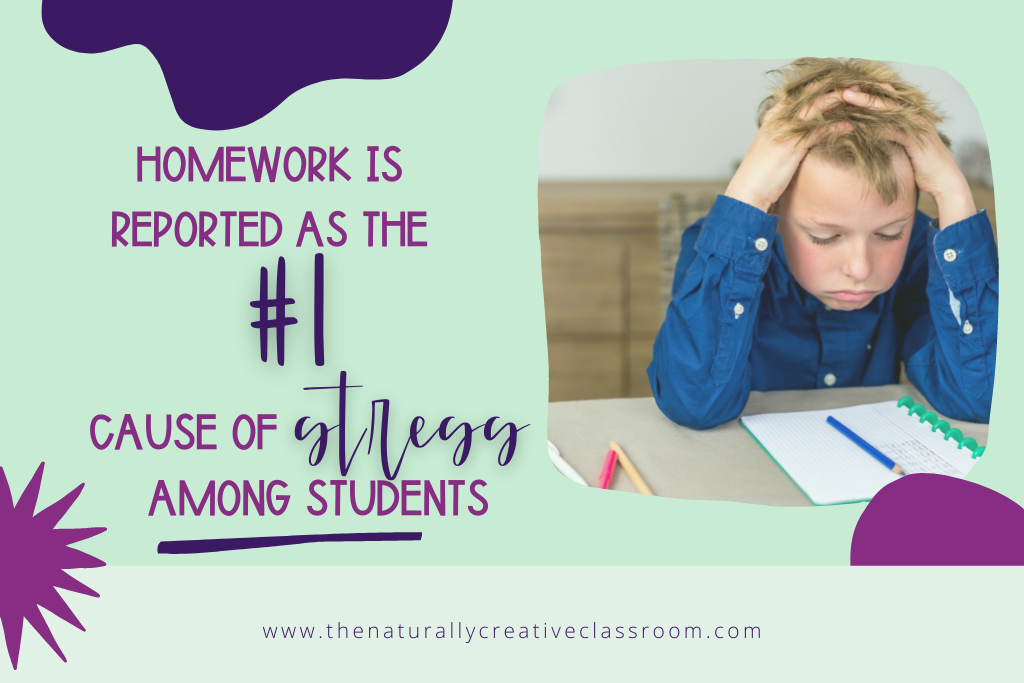
What about remote learning and homework online?
The challenges of COVID and remote learning have caused researchers, teachers, and parents to look at homework differently. The pandemic forced many of us to see (if not to address) the vast levels of access to basic internet service needed to make remote learning even approachable. Online education is not equitable across the country, therefore doing homework online is just as inequitable. Sometimes teachers may not realize this inequity exists within their classrooms.
I have worked in upper-middle-class areas where I assumed the students had access to high-speed internet at home. The school required students to spend a particular amount of time per week on an online math program. I was surprised to learn that the only source of the internet for some students was a parent’s phone.
Another problem with online homework during pandemic learning is that the lines between “homework” and “schoolwork” have become blurry. There is no clear definition for kid’s “homework,” adding more stress into their days.
So, is homework beneficial?
I suppose you are expecting a resounding “NO!” as an answer to this question. Some research shows that homework can be beneficial to older students, meaning high school-age kids. They could be given some homework, but not the three hours a night many high schoolers reports. I can’t entirely agree with giving homework to students younger than high school.
There is one type of homework that is shown to have many benefits- reading for pleasure! From critical thinking to growing empathy skills, reading for fun every night is one type of homework that is good for kids.
Should we give kids a big homework pass?
I am going to stand by my previous views on homework. Yes, I think kids should all get a homework pass. Let them play, engage in sports and yes, relax in front of the television at night with their families. A healthy work-life balance is essential for the mental and physical health of our children. The sheer amount of research showing the negative of homework versus the one study pointing at a precarious link between homework and test scores is not enough for me to throw my hat into the homework ring.

Hi, I'm Karen!
I help teachers like you motivate your students to love math, increase their creativity and their self confidence! I live in Geneva, IL with my kids, Ellie and Liam, my dog Freida and my cats Rascal and Molly.
Grab your Guide to Gamification today!
Leave a reply cancel reply.
You must be logged in to post a comment.
Copyright 2021 | The Naturally Creative Classroom | All Rights Reserved

Is Your Job Killing You? Literally Killing You?
Recent research indicates that several work stress factors can cause deaths..
Posted November 5, 2018

It’s common to hear people complain that their job is “killing” them or claim that the drudgery of their jobs “sucks the lifeblood” out of them, leaving them exhausted, depressed , and lethargic by the end of the work week. According to recent research by Jeffrey Pfeffer, Ph.D. of the Stanford Graduate School of Business, certain types of workplace conditions may actually result in premature death. In his 2018 book entitled Dying for a Paycheck: How Modern Management Harms Employee Health and Company Performance—and What We Can Do About It , Pfeffer reports on his meta-analysis research which examined the types of workplace and work-related characteristics that contribute to early death and other health and mental health problems.
Pfeffer enumerates ten work-related factors that can impact health and longevity (Pfeffer 2018, p. 43):
- Being unemployed sometimes as a result of a layoff.
- Not having health insurance.
- Working shifts and also working longer periods, e.g., ten or twelve-hours shifts.
- Working long hours in a week (e.g., more than 40 hours per week).
- Job insecurity (resulting from colleagues being laid off or fired).
- Facing family-to-work and work-to-family spillover or conflict.
- Having relatively low control over one’s job e.g., workload.
- Facing high work demands such as pressure to increase productivity and to work quickly.
- Being in a work environment that offers low levels of social support (e.g., not having close relationships with co-workers.
- Working in a setting in which job- and employment-related decisions seem unfair.
The impact of these work stressors can be as “harmful as secondhand smoke” according to Pfeffer’s research on health and mental health effects.
Stress researchers have well documented how stress (whether it be work stress or personal stress) results in increased levels of cortisol in our blood and cortisol is associated with many types of physical ailments (e.g., cardiac problems like hypertension or certain types of cancer). So when Jeffrey Pfeffer says that work stress can lead you to an early grave, he’s not kidding. And he has the data to back it up. I witnessed this anecdotally when a co-worker of mine was being stalked by a former disgruntled student. The student had even gone to such lengths as to find out where my co-worker's daughter attended school and posted pictures of the daughter. Things had gotten so bad that the police had to intervene. Several months later, my co-worker developed breast cancer. She had been in excellent health up to the time when the student began stalking her. While we can't know if there was a causal link between her stress and illness, and there were likely other etiological factors in addition to the stress created by stalking, it is also well-accepted that cortisol generally impacts one’s physical health negatively.
I highly recommend that you read Jeffrey Pfeffer’s book. It is thorough, thoughtful, and well-researched. He provides many important strategies for how employees can take back control over their own health and mental health and discusses what factors help to make for healthy workplaces.
Pfeffer, J. (2018). Dying for a Paycheck: How Modern Management Harms Employee Health and Company Performance –and What We Can Do About It, New York: Harper Collins.

Alan A. Cavaiola, Ph.D., is a professor in the Department of Psychological Counseling at Monmouth University in New Jersey.
- Find a Therapist
- Find a Treatment Center
- Find a Psychiatrist
- Find a Support Group
- Find Teletherapy
- United States
- Brooklyn, NY
- Chicago, IL
- Houston, TX
- Los Angeles, CA
- New York, NY
- Portland, OR
- San Diego, CA
- San Francisco, CA
- Seattle, WA
- Washington, DC
- Asperger's
- Bipolar Disorder
- Chronic Pain
- Eating Disorders
- Passive Aggression
- Personality
- Goal Setting
- Positive Psychology
- Stopping Smoking
- Low Sexual Desire
- Relationships
- Child Development
- Therapy Center NEW
- Diagnosis Dictionary
- Types of Therapy

Understanding what emotional intelligence looks like and the steps needed to improve it could light a path to a more emotionally adept world.
- Coronavirus Disease 2019
- Affective Forecasting
- Neuroscience
What illnesses can homework cause?
There is nothing in homework that is deadly.
ANSWER 2: they're right, technically, homework can't kill you, but if we keep taking down trees to make homework, we're going to kill ourselves, basically, because there are no more trees to make oxygen, and with no oxygen, we can't breath, resulting in the extinction (death) of the human race as we know it.
Everybody would love to play all the time and not have to work. School is your job, and just like your parents have to go to a job every day, you have to do schoolwork even if it's not fun. Homework is not "bad" or harmful - it helps you learn the material and do better in school so you can get a better job and make more money once you are grown up.
It can cause better understanding of the work and better grades.
Work does not cause illness - bacteria and viruses cause illness.
Homework can't kill you, but you may grow tired of the amounts.
Add your answer:
How many illnesses do corsets cause?
Wow, what homework is that??English Essay :|
Can Homework cause a student to fail?
If you don't do your homework -- yes, it will cause you to fail. Doing homework will not cause you to fail.
Can plutonium causing neurological illnesses?
Plutonium is not a cause of neurological illnesses.
What are cause of illnesses in morocco?
Why does unemployment cause illnesses.
I don't think that it causes illnesses but mostly mental deseases..
Can a disease cause mental illnesses?
Many diseases do cause mental illnesses, especially when they affect the brain. Sometimes there is a chemical imbalance in the body that can cause mental illness, too.
What is the cause for this sentence Tom called Kevin to ask what their homework assignment was?
The cause is that Tom obviously did not know what their homework assignment was.
What illnesses can worry cause?
Worry cannot cause a direct illness but can indirectly cause an illness to arise. Worry causes stress on the body and immune system making it easier for illnesses to grow and spread.
What does to much homework cause?
What illnesses may cause a lack of coordination.
There are a few illnesses that may cause a lack of coordination. A stroke could cause this as could a brain tumor, alcohol poisoning, wilson's disease or even chronic fatigue.
What maternal illnesses can cause mental retardation in infants?
Maternal infections and such illnesses as glandular disorders, rubella, toxoplasmosis, and cytomegalovirus (CMV) infection may cause mental retardation
What are two illnesses that bloodbourne pathogens can cause?
HIV and Hepatitus.
Top Categories

- Film and TV
To make sure you never miss out on your favourite NEW stories , we're happy to send you some reminders
Click ' OK ' then ' Allow ' to enable notifications

Shocking picture shows most dangerous object on Earth that kills you in two days if you look at it for 300 seconds
The most dangerous object on earth can kill in just two days.
Callum Jones
A shocking picture shows the most dangerous object found on Earth, and it's something you certainly don't want to be exposed to.
I think we have probably all conjured up slightly different images when trying to think of the world's dangerous object, though a lot of us could have predicted where it is found.
And the 'Elephant's Foot' is not to be messed with.
According to science magazine Nautilus, 30 seconds of exposure to the object will mean your cells will begin to hemorrhage.
Stick around for four minutes and you can expect vomiting, diarrhea and fever.
If you spend 300 seconds with the object, you have two days to live.
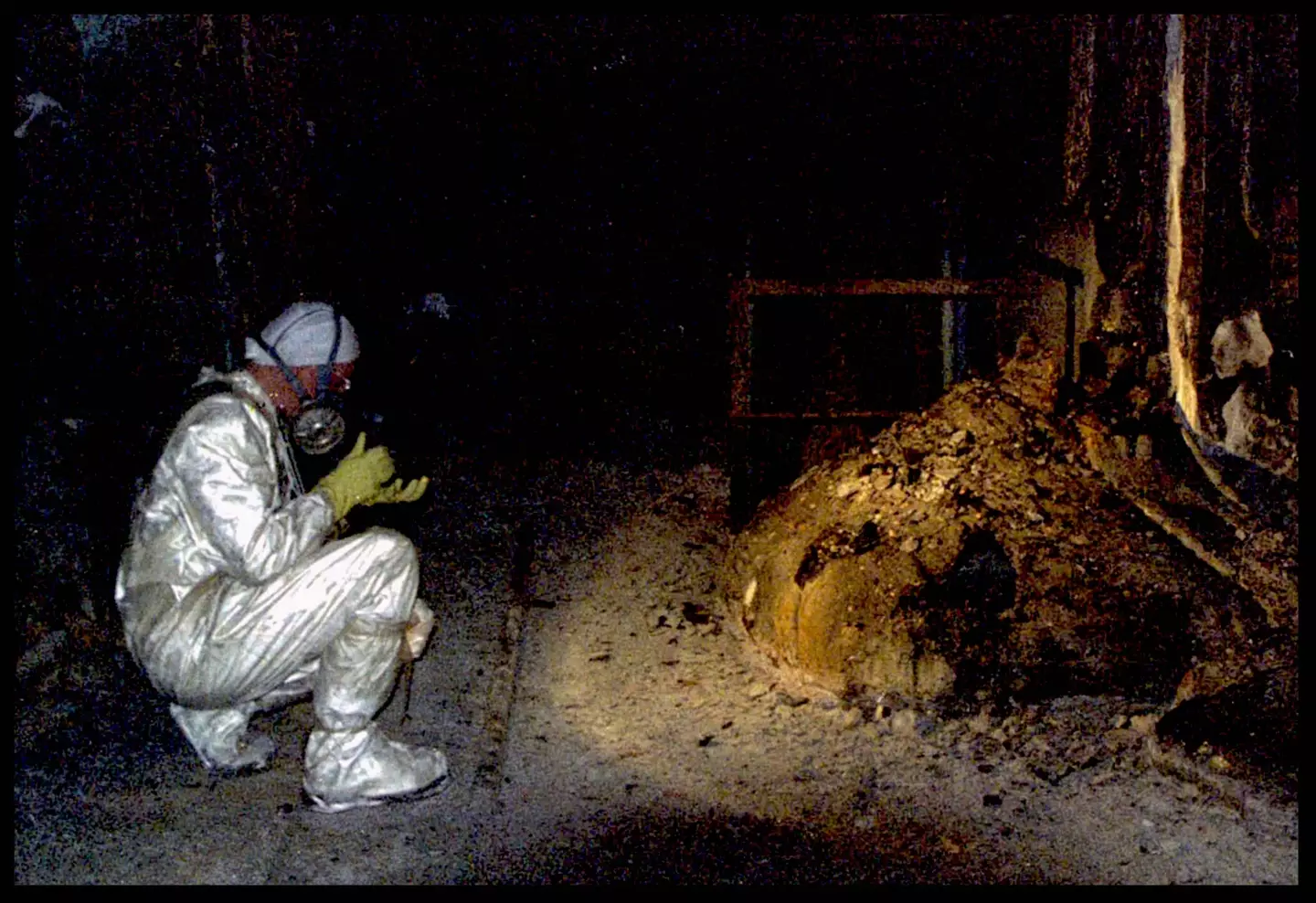
The object is found in a basement in Pripyat , Ukraine – the home of the Chernobyl nuclear disaster that took place nearly four decades ago.
Since, the room has been referred to as the 'Elephant’s Foot of Chernobyl', as the radioactive mass that gathered underneath Chernobyl gave off the facade of the wrinkled foot of an elephant.
Standing at a whopping two metres in length, the 'foot' inside of Unit 4 is comprised of concrete, sand and melted nuclear fuel.
Of course, radiation levels have died down over the years, but very much steadily and slowly.
The nuclear fallout was so potent that photos of the molten mass could only be snapped a decade later.
When the below photo was taken, you could spend up to an hour with the object before guaranteeing yourself an early grave.
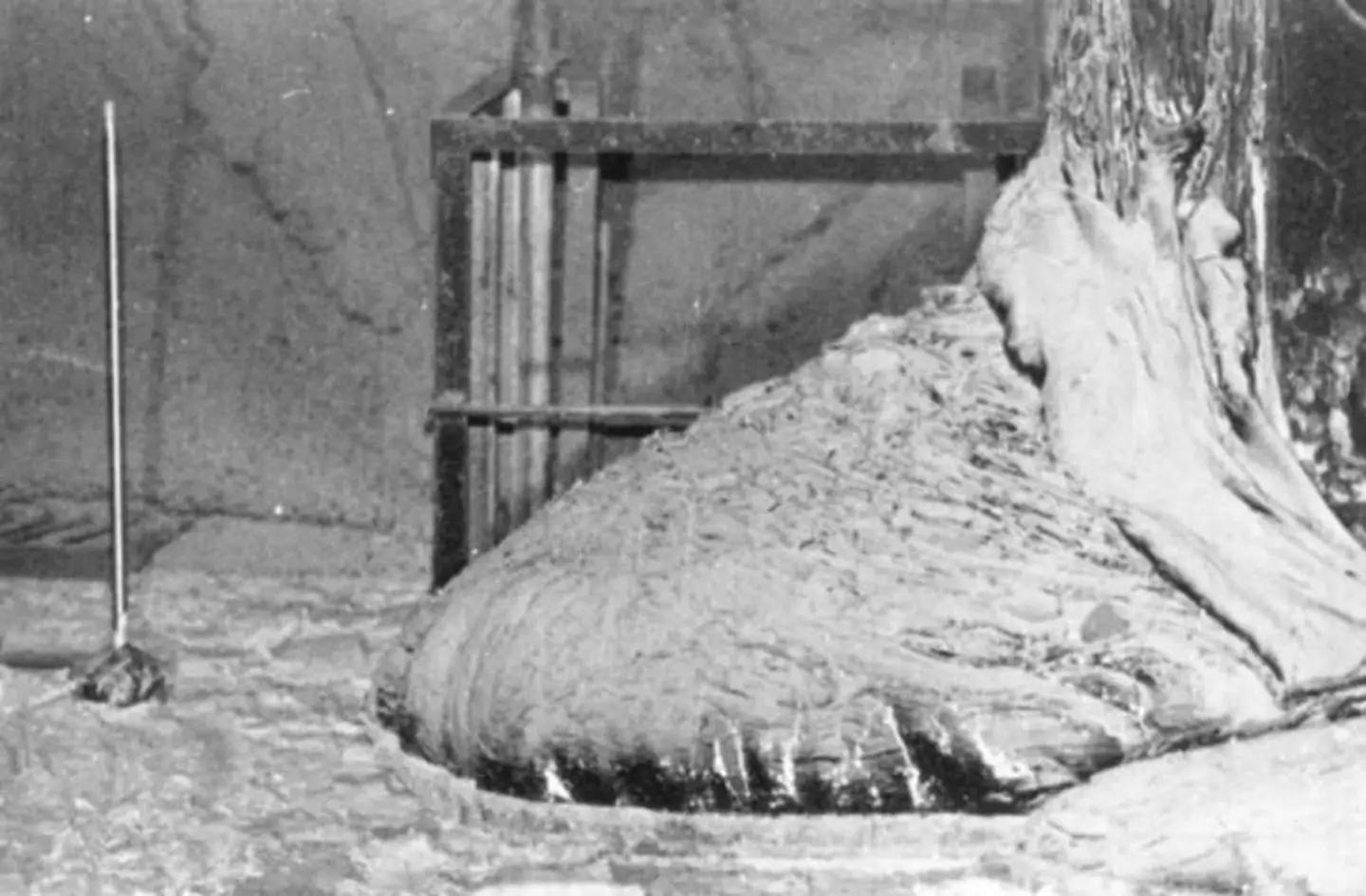
But back in 1986, radiation levels on the 'foot' were measured at 10,000 roentgens per hour – enough to deliver a fatal dose of radiation to anyone standing within three feet of it for 300 seconds.
The scary object found in the basement is reported to remain dangerously radioactive for tens of thousands of years.
While a lot of objects are deemed as dangerous on the Chernobyl site, a claw used to pick up the graphite and material that exploded out of reactor four back in the day is certainly up there.
Abandoned deep in the forest, it's estimated to produce around 950uSv of radiation a day, and any contact is extremely dangerous.
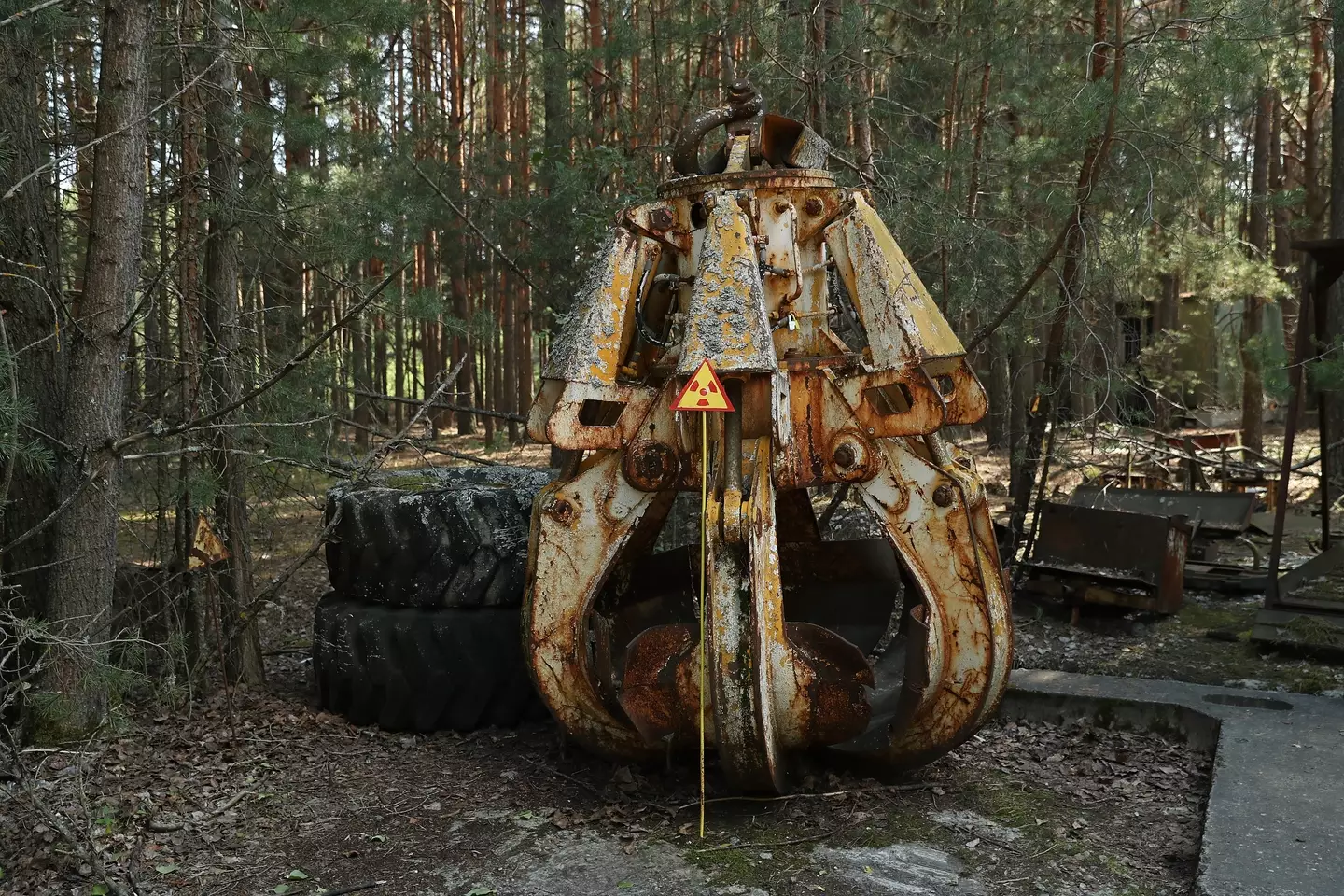
The claw's work was very important at the time of the disaster, as explained by Australian archaeologist Robert Maxwell.
Speaking to news.com.au, he said : "The three rooftops alongside the exploded reactor four were, at the time, the most lethally dangerous places on earth.
"One of the rooftops was measuring in the tens of thousands of roentgen, which was the measurement of radioactivity back then.

"When reactor four of Chernobyl exploded, it liberated the lid of the reactor vessel. This 6-10 tonne concrete roof was blown into the air and then landed vertically into the hole. All of the control rods, the graphite, the fuel rods and everything else blew out of the reactor and landed on the rooftops nearby.
"So imagine someone trying to stand on a rooftop that was so radioactive that it could give you such acute radiation sickness that you basically cook yourself and die.
"So this Claw was deeply involved in all the intensely radioactive material as it moved the material back into the core. To say the Claw is highly radioactive and dangerous is not an exaggeration."
Topics: Chernobyl , News
@ CallumJ2709
- Shocking video shows what Earth would look like if all the ice melted
Choose your content:

Scientists are attempting to 'de-extinct' the mammoth by 2028
The mammoth is one of three species scientists are hoping to bring back from extinction.

Incredible video shows Dubai's artificial rain that's used to combat high temperatures
The united arab emirates uses cloud seeding to create rainfall and help to combat its incredibly high temperatures.

Millionaire's will stated only the family who could have 'most babies in a decade' would inherit fortune
Charles vance millar's will led to chaos in toronto for a ten-year period.

True story of serial killer who kidnapped women only to release them on an island so he could hunt them
He tortured and killed at least 17 women.

Play Minecraft Games with Game Pass
ALSO AVAILABLE ON:
Minecraft is available to play on the following platforms:

*Mac and Linux are compatible with Java Edition only.

Poisonous Potato Update
The (s)mashing update you always asked for!
Imagine being a potato. Now imagine being the potato’s less popular sibling who didn’t inherit the tuber-licious looks the rest of your family possesses. What’s worse is – you're facing the impossible decision of what to do with all this starch? Since neither French fries nor couch potato sat right with you, there's only one option remaining. Congratulations friend, you’re a poisonous potato.
For years, Minecraft’s own toxic tuber has been neglected and underappreciated, lacking both purpose and usefulness. For years, you – the community – tried to highlight this, working tirelessly to bring it to our attention and literally begging us for more functionality. As of today, your concerns are a thing of the past.
Mojang Studios is proud to release our most well-boiled update to date that will add so much usability to the poisonous potato that even tater-haters will become devoted spud-buds. The Poisonous Potato Update – rich in both carbs AND features! You asked. We delivered. Or maybe you didn’t ask, but we delivered anyway? In any case, it is HERE!

GET THE SNAPSHOT UPDATE
Snapshots are available for Minecraft: Java Edition. To install the snapshot, open up the Minecraft Launcher and enable snapshots in the "Installations" tab. You can even play the snapshot on your own Java Realms together with your friends!
Remember, snapshots can corrupt your world, so please back up your world and/or run the snapshot in a different folder from your main worlds.
-> DOWNLOAD THE CROSS-PLATFORM SERVER JAR
Poisonous potato add-on.

The roots of the poisonous potato run deep within Minecraft and extends far beyond Java Edition. Therefore, it should come as no surprise that the tuber-lar sensation has spread its influence to Bedrock Edition as well. With Jigarbov’s Poisonous Potato add-on , you’ll be able to experience the joy of the poisonous potato the way it was always intended – through blocks and furniture to weapons and armor.
-> GET THE ADD-ON
Gameplay & features.
- Poisonous potatoes – LOTS of poisonous potatoes!
- A few normal potatoes too!
- The homeland of all potato kind
- Five spud-tastic biomes: fields, hash, arboretum, corruption, and wasteland
- Experience the life of a potato – from its inception as a raw potato picked from the fields, through cooked hash browns, to its eventual decay
- Local weather with a-mashing effects
- Added the Colosseum, home to the lord of potato kind...
- A whole sack of a-peeling new blocks
- Rich in Vitamin C, Vitamin B6, and Niacin!
- No new mineral blocks. No need! The blocks themselves contain minerals: Potassium, Magnesium, and Iron!
- Added the frying table – everyone asked for it, so we added it. It fries potato things. It's a really nice model!
- Added functionality to the fletching table. You can now fletch toxic resin into more refined versions of the resin.
- Added impurities because purity is overrated
- Added a whole bunch new gadgets that will tune your poisonous potato game up to eleven!
- You get it by now. They’re all poisonous potatoes...
TECHNICAL CHANGES
- The flux capacitor integration now synergizes with quantum voxelization, which enables a 360-noscope enhancing real-time RTX terrain-rendering nightshade multibox spectrum acceleration while optimizing transdimensional entity synchronization for seamless vitelotte-king edwards-russel burbank experiences!
WHAT HAPPENS IF I DOWNLOAD THE UPDATE?
Then you will be the proud owner of the file that contains the update.
WHAT CAN I EXPECT IN TERMS OF GAMEPLAY?
Poisonous potatoes. We hope this article has made that perfectly clear.
I DON’T BELIEVE I ASKED FOR THIS UPDATE, IF I’M HONEST.
You might not have – but your brain (or maybe belly) did!
ARE THERE CURRENTLY ANY OTHER CARB-BASED UPDATES IN THE WORKS?
Great question! Please look forward to the Radioactive Rice Update and Toxic Taro Update in the very distant future!
SHARE THIS STORY
Community creations.
Discover the best add-ons, mods, and more being built by the incredible Minecraft community!
Block...Block...Block...

Solar eclipse 2024: 8 strange things that could happen during the rare event
A rare occurrence in orbit could lead to some strange happenings here on Earth.
The North American solar eclipse on April 8, 2024, is expected to hit totality in 15 U.S. states.
What can Americans expect to happen in the sky as well as on the ground?
SOLAR ECLIPSE 2024: WHERE AND HOW TO VIEW THE RARE ORBIT HITTING THE US
Here are eight weird things that could happen during a solar eclipse.
Baily’s beads is a strange effect that occurs as the moon closes in on the sun during a solar eclipse.
READ ON THE FOX NEWS APP
The phenomenon, viewed safely with proper eyewear, is a sliver of light at the edge of the eclipse, often referred to as the Diamond Ring Effect.
Just as the moon covers or begins to uncover the sun, onlookers might be able to view this "interesting edge effect," Johns Hopkins University astrophysicist Dr. Bill Blair told Fox News Digital.
In "the phenomenon known as ‘Baily's beads’ … the sun can actually peak through lunar valleys right along the edge of the moon's limb," he said.
Eclipse viewers can maximize their chances of seeing effects like this by traveling along the "edge" of the total eclipse zone, Blair suggested.
During a solar eclipse , wildlife species have reacted as if day suddenly turned to night.
FOR SOLAR ECLIPSE ON APRIL 8, SOME US SCHOOLS WILL BE CLOSED FOR THE DAY
During an eclipse, local animals and birds often "prepare for sleep or behave confusedly," according to the University of Dallas.
Both physical and auditory animal behaviors will shift during the eclipse, National Geographic noted in an article.
"The early onset of darkness disrupts animals’ circadian rhythms, sparking a possible chorus of owl hoots, cricket chirps or even coyote calls, depending on the eclipse-viewing location," NatGeo wrote.
Because of this expected shift in sound, NASA has released its Eclipse Soundscapes Project, prompting eclipse viewers to pay attention and record differences in animal behaviors in their area.
FOR SOLAR ECLIPSE SAFETY, HERE'S WHAT DRIVERS SHOULD NOT DO ON THE ROAD DURING THE RARE EVENT
"Reports of these atypical animal behaviors date back centuries, but the effects of an eclipse on plant and animal life are not fully understood," NASA wrote in an article.
"The NASA-funded Eclipse Soundscapes Project will collect the sights and sounds of a total solar eclipse with help from interested members of the public to better understand how an eclipse affects different ecosystems."
The changing orientation of the sun’s light can cast some pretty cool shadows on Earth.
Light that filters through the leaves of trees has been observed to leave crescent-shaped shadows as eclipse totality closes in, Blair shared.
NASA also recommends the use of a pinhole projector to view images of the crescent sun.
These pinhole cameras can also be used during the partial phases of the eclipse instead of wearing protective glasses, according to Blair.
SOLAR ECLIPSE 2024: FORMER NASA ASTRONAUT SHARES WHAT IT LOOKS LIKE FROM SPACE, HOW TO SAFELY VIEW IT YOURSELF
"Even more impressive, if you have a colander or a big soup spoon with small holes in it, hold it up, and you will get a whole bunch of little eclipses," he said.
During total eclipses only, special shadow bands can be seen in the seconds before totality.
Shadow bands can show up across plain-colored surfaces, appearing as thin, wavy lines of alternating light and dark, as NASA noted.
The effect is similar to the sheen of a swimming pool.
The weather during a solar eclipse could change rather quickly.
Local temperatures could drop more than 20 degrees near eclipse totality, the University of Dallas said.
This is because when sunlight fades, the weather starts to cool down.
NASA reported that a 2001 eclipse in Zambia dropped the air temperature by nearly 15 degrees.
In addition to temperature changes, a solar eclipse could bring windy weather.
A 2016 study by the University of Reading found that eclipse events could pick up wind speeds and change wind directions.
8 THINGS YOU SHOULD BRING TO A SOLAR ECLIPSE VIEWING
"As the sun disappears behind the moon, the ground suddenly cools, just like at sunset," University of Reading professor Giles Harrison wrote in a press release.
"This means warm air stops rising from the ground, causing a drop in wind speed and a shift in its direction, as the slowing of the air by the Earth’s surface changes."
Eclipse events are known for interrupting radio frequencies.
This is because of the "sudden reduction in solar radiation reaching Earth’s atmosphere," said NASA.
"Since the ionosphere contains charged particles (ions and electrons) and is responsible for reflecting and refracting radio waves, changes to the ionosphere can also affect radio communications and navigation systems," NASA wrote in an article.
CLICK HERE TO SIGN UP FOR OUR LIFESTYLE NEWSLETTER
This alteration in the ionosphere can change how radio waves "propagate through it," NASA reported, which can cause signal fading, absorption and refraction.
Solar prominences are rare but could appear during a solar eclipse.
Onlookers, with appropriate safety eyewear, might be able to spot the solar corona peeking out from behind the moon’s shadow.
The effect will look similar to flower petals framing the moon – but the prominence is an extension of the sun’s surface in a red, glowing plasma loop, according to NASA.
These prominences loop hundreds of thousands of miles into space; scientists are still researching how and why they form.
As the moon will shadow the sun’s light, some other stars and planets could be visible.
The Planetary Society reported that Venus may appear bright to the sun’s right or bottom right.
Jupiter, which will appear dimmer, could be seen to the left or upper left of the sun.
What appears will be dependent on weather conditions per location, but astronomic features that shine brightest will have the best chance of showing up, according to Live Science.
For more Lifestyle articles, visit www.foxnews.com/lifestyle.
Original article source: Solar eclipse 2024: 8 strange things that could happen during the rare event

Why do I have to pay upfront for you to write my essay?
Customer Reviews
Experts to Provide You Writing Essays Service.
You can assign your order to:
- Basic writer. In this case, your paper will be completed by a standard author. It does not mean that your paper will be of poor quality. Before hiring each writer, we assess their writing skills, knowledge of the subjects, and referencing styles. Furthermore, no extra cost is required for hiring a basic writer.
- Advanced writer. If you choose this option, your order will be assigned to a proficient writer with a high satisfaction rate.
- TOP writer. If you want your order to be completed by one of the best writers from our essay writing service with superb feedback, choose this option.
- Your preferred writer. You can indicate a specific writer's ID if you have already received a paper from him/her and are satisfied with it. Also, our clients choose this option when they have a series of assignments and want every copy to be completed in one style.
Do my essay with us and meet all your requirements.
We give maximum priority to customer satisfaction and thus, we are completely dedicated to catering to your requirements related to the essay. The given topic can be effectively unfolded by our experts but at the same time, you may have some exclusive things to be included in your writing too. Keeping that in mind, we take both your ideas and our data together to make a brilliant draft for you, which is sure to get you good grades.

Affiliate program
Refer our service to your friend and receive 10% from every order

IMAGES
VIDEO
COMMENTS
According to Thomas Jefferson School of Law sitting for a long time is a source of Pulmonary Embolisms (P.E.) which can lead to sudden cardiac death. In simple words sitting for a long time can lead to formation of blood clots which movement in body can cause sudden death. The other fatal consequence of overstudying is lack of sleep.
But they also say the answer may not be to eliminate homework altogether. Emmy Kang, mental health counselor at Humantold, says studies have shown heavy workloads can be "detrimental" for students ...
Think big picture. Forcing a child to complete a homework assignment, after they have spent a reasonable amount of time on it (10 minutes per grade), is not promoting balance. Keep academic ...
Experts in the field recommend children have no more than ten minutes of homework per day per grade level. As a fifth- grader, Timothy should have no more than fifty minutes a day of homework ...
The study shows 56 percent of students find homework to be a primary stressor. Students also say that they often find homework to be tedious and boring and do not believe they are gaining much out of it. Further reports indicate that students are more stressed and less able to sleep due to homework load. This lack of sleep and stress leads to ...
But they also say the answer may not be to eliminate homework altogether. Emmy Kang, mental health counselor at Humantold , says studies have shown heavy workloads can be "detrimental" for ...
We would usually take issue with the seemingly poor use of the word "literally" here, but precedent shows that it actually is possible to die from studying too much. In 1900, Harvard Law School ...
The Stressed Brain. Even when homework is well-designed and does foster learning, too much of it can be damaging. Children who have more than one hour of homework each night overwhelmingly report ...
Homework shouldn't be used to teach complex new ideas and skills. Because it's so important that homework is closely tied with current learning, it's important to prepare to adjust your assignments on the fly: if you end up running out of time and can't cover all of a planned subject on a given day, nix any homework that relies on it.
Study Shows Overwork Can Kill You, Literally. FILE - Workers of the Ryongaksan Soap Factory make disinfectants in Pyongyang, North Korea, March 19, 2020. A report cities North Korea as the country ...
A TIME cover in 1999 read: "Too much homework! How it's hurting our kids, and what parents should do about it.". The accompanying story noted that the launch of Sputnik in 1957 led to a push ...
This situation has not improved over time: Compared with summer weekends, school-month weekdays from 2016 to 2019 show a pediatric suicide rate increase of 62 percent. The increase was 42% from ...
For kids, the critical questions are, "can homework kill you?" and "is homework illegal anywhere?". Unfortunately for kids, the answer to the last two questions is "no," but the other questions have been debated for over 100 years, with the pendulum swinging in both directions.
What value do students get from doing homework? According to Kathy Seal, co-author of Motivated Minds: Raising Children to Love Learning, most homework does not advance the education of elementary school children. On the contrary, stuffing a great deal of information into their heads makes it harder to retain the data and can even damage their eagerness and joy of learning.
increased chronic pain. weakened immune system. agitated gastrointestinal (GI) functioning. In the short term, stress may also lead to: tension in the body. high blood pressure. poor sleep or ...
Pfeffer enumerates ten work-related factors that can impact health and longevity (Pfeffer 2018, p. 43): Being unemployed sometimes as a result of a layoff. Not having health insurance. Working ...
00:00 - Can homework kill you?00:40 - Has anyone died from studying?01:14 - Does homework cause depression?01:45 - In what states is homework illegal?02:18 -...
Don't kill yourself please it would make me feel real bad I have a job nowadays I hated school just like you wanted to kill myself but I didn't because I searched for the things I go to school for so that I could take care of my family so that I could game because those two things made me feel real happy and that pushed me through search for the things you love and pleas talk to someone please ...
There is nothing in homework that is deadly. ANSWER 2: they're right, technically, homework can't kill you, but if we keep taking down trees to make homework, we're going to kill ourselves ...
Stick around for four minutes and you can expect vomiting, diarrhea and fever. If you spend 300 seconds with the object, you have two days to live. The most dangerous object on Earth. Photo 12/Universal Images Group via Getty Images. The object is found in a basement in Pripyat, Ukraine - the home of the Chernobyl nuclear disaster that took ...
Mojang Studios is proud to release our most well-boiled update to date that will add so much usability to the poisonous potato that even tater-haters will become devoted spud-buds. The Poisonous Potato Update - rich in both carbs AND features! You asked. We delivered. Or maybe you didn't ask, but we delivered anyway?
While the idea behind a kill switch is fairly simple, different types can be installed in virtually any car. As vehicles were being stolen at an estimated rate of one every 32 seconds in 2022, it ...
Here are eight weird things that could happen during a solar eclipse. Baily's beads is a strange effect that occurs as the moon closes in on the sun during a solar eclipse. READ ON THE FOX NEWS ...
Research papers can be complex, so best to give our essay writing service a bit more time on this one. Luckily, a longer paper means you get a bigger discount! Hire a Writer. Nursing Management Business and Economics Education +117. 63 Customer reviews.
Besides possibly hurting your eyes (wear eclipse glasses please!), you can actually damage the image sensor on your camera or phone. To avoid this, NASA and other experts have some tips. 1) Use a ...